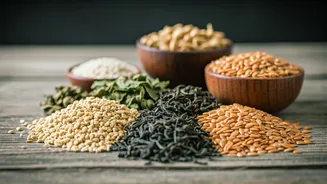Embrace Lifestyle Shifts
The initial step toward conquering constipation involves integrating certain lifestyle modifications into your everyday routine. Increasing your fiber
intake is crucial; consider incorporating fiber-rich foods like fruits, vegetables, and whole grains into your meals. Staying adequately hydrated is equally important, as water helps soften stools, making them easier to pass. Regular physical activity, such as walking or engaging in other forms of exercise, stimulates the digestive system, promoting regular bowel movements. Implementing a consistent daily routine that includes making time for bathroom breaks can also train your body's natural rhythms. The combination of dietary changes, adequate hydration, and regular exercise offers a holistic approach, supporting your digestive health and helping you manage constipation.
Lemon and Warm Water
Lemon juice can stimulate the digestive system due to its acidic properties, aiding in the breakdown of food. Consuming warm water in the morning with the juice of half a lemon can encourage a bowel movement. This practice is often considered a gentle, yet effective method for addressing constipation. The combination of warmth and acidity can help relax the digestive muscles, facilitating smoother passage. It's a simple, easily adoptable remedy that can be integrated into your morning routine. Drinking this mixture first thing in the morning can also help to hydrate your body, which, combined with the lemon, can kickstart your digestive processes. The natural acidity of lemon acts as a mild stimulant, assisting in the bowel movements.
The Power of Olive Oil
Olive oil acts as a natural lubricant for the digestive tract, which helps soften stools and ease their movement through the intestines. Taking a tablespoon of olive oil in the morning on an empty stomach can provide quick relief. The lubricating properties of olive oil facilitate the easy passage of stools, reducing strain during bowel movements. Besides its immediate effects, olive oil may also have anti-inflammatory properties, which support overall gut health. Consuming olive oil is generally considered a safe and effective remedy. The simple addition of olive oil to your diet helps improve your digestive comfort. Always consult with a healthcare professional to ensure this remedy aligns with your individual health needs.
Harnessing the Power of Prunes
Prunes are well-known for their high fiber content and natural laxative properties. They contain both soluble and insoluble fiber, which add bulk to the stool and encourage regular bowel movements. Furthermore, prunes contain sorbitol, a sugar alcohol that draws water into the colon, softening stools and promoting easier elimination. Consuming a small serving of prunes, either directly or as part of a meal, can be an effective way to relieve constipation. Prunes are a convenient and tasty way to boost your fiber intake, supporting digestive regularity. The combination of fiber and sorbitol makes prunes a popular and often successful remedy. Consider adding this fruit to your daily diet to manage and improve your digestive health.
The Magnesium Citrate Solution
Magnesium citrate is an osmotic laxative that draws water into the intestines, softening stools and stimulating bowel movements. Available in liquid or tablet form, it provides a powerful yet often rapid relief from constipation. Magnesium citrate's action is due to its ability to attract water, which increases the volume and pressure within the colon. This process facilitates the passage of stools. It's important to use magnesium citrate cautiously, as excessive use can lead to side effects such as diarrhea and dehydration. Always follow dosage instructions carefully. As with any remedy, it is beneficial to consult a healthcare provider before using magnesium citrate, especially if you have underlying health conditions.
The Benefits of Flaxseed
Flaxseed is rich in both soluble and insoluble fiber, making it an excellent natural remedy for constipation. The fiber absorbs water in the gut, adding bulk to the stool and promoting regular bowel movements. In addition to fiber, flaxseed also contains omega-3 fatty acids, which can help reduce inflammation and support overall gut health. Consuming flaxseed can be as easy as adding it to smoothies, sprinkling it on cereals, or incorporating it into baked goods. This versatile seed is a valuable addition to your diet. The combination of fiber and omega-3 fatty acids contributes to flaxseed's effectiveness in managing constipation. By increasing fiber intake, flaxseed provides a gentle and natural approach to digestive wellness.
Aloe Vera's Soothing Properties
Aloe vera is renowned for its anti-inflammatory and soothing properties, which can also extend to digestive health. Aloe vera juice acts as a natural laxative due to its anthraquinone content, which stimulates bowel movements. The juice helps increase water in the intestines and encourages peristalsis. While aloe vera can effectively relieve constipation, it's crucial to consume it in moderation. Excessive intake might lead to side effects such as abdominal cramps and diarrhea. Start with a small dose and monitor your body's response. Choosing high-quality aloe vera juice is important. Consulting a healthcare provider before use is advisable to ensure it's suitable for your specific health needs and any potential interactions.





















